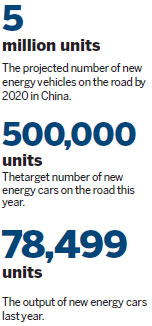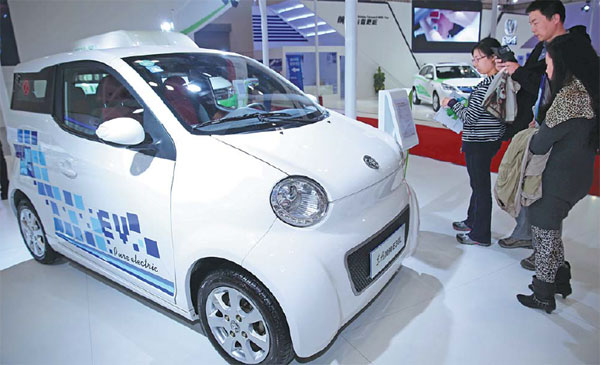Changes crucial to boost new energy car industry
Fresh outlook, policies and subsidies key to hit goals and harness opportunities
The Chinese government is considering new preferential policies for the emerging new energy car industry.
The Ministry of Science and Technology issued a draft of the government's plan to support research and development of new energy vehicles to gain public opinion on Feb 16.
Beijing authorities also announced that the city would be friendlier to new energy car owners, by allowing them to pay less in parking fees and highway tolls by the end of March.
In 2012, the State Council set a goal of getting 5 million new energy vehicles on the road by 2020.
To meet this target the government plans to establish a research and development system and industrial chains for electric cars by 2020.
According to the China Association of Automobile Manufacturers, the output and sales of new energy vehicles in China were 78,499 and 74,763 in 2014, 3.5 and 3.2 times the figure in 2013.
Despite the growth, there is still a way to go to reach the central government's goal to have 500,000 new energy cars on the road by the end of this year.
Compared with sales of more than 23 million cars in China last year, the sales of new energy vehicles only accounted for a small proportion.
Dong Yang, secretary-general of the automobile manufacturers association, said he did not think the government would hit its new energy car goals unless it offered new preferential policies, as projected sales this year are about 150,000 to 200,000.
Ambition
The draft plan said electrification of power, lightweight structure and vehicle intelligence were the core technologies for the future development of new energy cars.
The next five to 10 years will be a period of strategic importance for the reorganization, transformation and upgrading of the global automobile industry.
According to the Ministry of Science and Technology, the Chinese automobile industry faces three challenges: the transition from a global sales leader to a leading manufacturing power, pollution control of car exhausts and energy security and national development at a low carbon level.
The government wants to achieve three goals through developing the country's new energy automobile market: upgrading the automobile industry, protecting the environment and using less fuel.
Several industry insiders believe that with the huge domestic market, electric cars will offer China new opportunities to grow. However, they warned that the Chinese automobile industry should not fall into the "same old trap" where foreign carmakers take the main share of the market.
The government has different attitudes towards electric cars and hybrid electric cars. It offers financial backing for technology research and development, as well as high subsidies for electric car buyers. For hybrid electric vehicles, the government only financially supports technology and promotion.
Big State-owned automobile enterprises' position in the two markets may be the reason why the government acts differently.
In the past 50 years, many Chinese automobile companies established joint ventures with foreign car manufacturers to learn advanced techniques. The result was that foreign players now dominate the Chinese auto market.
The government policies mean that electric cars from foreign companies are not eligible for subsidies, but those from joint venture companies are.
As a result, foreign companies tend to produce electric cars with local joint ventures, which is the "same route" as the development of fuel cars in China.
Industry insiders question whether Chinese companies will learn techniques through the electric vehicle joint venture process to help themselves grow competitively.
So far, the performance of Chinese automobile giants in the new energy industry has fallen flat. FAW's plug-in hybrid car Hongqi is still a concept and Dongfeng Motor Corporation has kept a low profile on new energy vehicles.
Private carmaker BYD is the only real "early bird" in the field.
"With central and local governments' strong support, China now has embraced the best environment for the growth of the new energy vehicle industry," said Hu Xiaoqing, PR and marketing director of Shenzhen BYD Daimler New Technology Co.
Emerging force
With State-owned big names showing lackluster performance in big- and medium-size cities, smaller brands have potential to enter the market, especially in small cities, townships and villages.
Most smaller brands offer low-speed electric cars, which run at speeds of less than 80 kilometers per hour and are sold for between 25,000 yuan ($3,997) to 50,000 yuan. Many electric motorcycle producers can also manufacture the cars.
Public security departments in many places do not issue plates to low-speed electric cars, as they do not consider them "real" vehicles.
However this could change after the government recognized low-speed electric cars as "normal" electric vehicles, in a draft standard for the industry in November.
Unlike big cities, small cities, townships and villages have plenty of land to build charging posts, which is an important foundation for the niche market ignored by many big enterprises.
Jia Xinguang, a Beijing-based independent industry analyst, said the government should focus more on promoting the sale and use of new energy automobiles in medium- and small-sized cities. "The subsidies in the smaller places are much lower than Beijing and Shanghai. They need more battery-charging stations and better after-sales service facilities," he said.
Learn from Germany
The German government's policies for new energy cars could provide inspiration for the Chinese government.
The German authority believes the development of electric cars should be a systemic plan that includes not only vehicles but also intelligent transportation and smart grids.
With this in mind it plans to create a new energy car environment, which will involve vehicles, city planning and an energy and industry chain.
Instead of subsidizing electric cars buyers, the German government financially backs companies in fields such as automobile manufacturing, energy and electric power to develop related products.
duxiaoying1@chinadaily.com.cn
|
Visitors look at a Dongfeng electric car. Industry insiders warn against Chinese new energy carmakers falling into the "same trap" of allowing foreign automakers to dominate the Chinese market. Chen ming / For china Daily |

(China Daily 03/02/2015 page19)















